| Louisiana and Britain Reading with Questions |
|---|
| www.studenthandouts.com ↣ American History ↣ American History Readings |
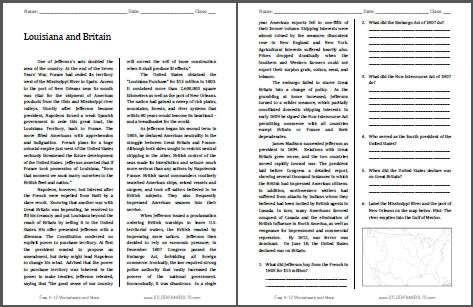 One of Jefferson's acts doubled the area of the country. At the end of the Seven Years' War, France had ceded its territory west of the Mississippi River to Spain. Access to the port of New Orleans near its mouth was vital for the shipment of American products from the Ohio and Mississippi river valleys. Shortly after Jefferson became president, Napoleon forced a weak Spanish government to cede this great tract, the Louisiana Territory, back to France. The move filled Americans with apprehension and indignation. French plans for a huge colonial empire just west of the United States seriously threatened the future development of the United States. Jefferson asserted that if France took possession of Louisiana, "from that moment we must marry ourselves to the British fleet and nation."
One of Jefferson's acts doubled the area of the country. At the end of the Seven Years' War, France had ceded its territory west of the Mississippi River to Spain. Access to the port of New Orleans near its mouth was vital for the shipment of American products from the Ohio and Mississippi river valleys. Shortly after Jefferson became president, Napoleon forced a weak Spanish government to cede this great tract, the Louisiana Territory, back to France. The move filled Americans with apprehension and indignation. French plans for a huge colonial empire just west of the United States seriously threatened the future development of the United States. Jefferson asserted that if France took possession of Louisiana, "from that moment we must marry ourselves to the British fleet and nation."Napoleon, however, lost interest after the French were expelled from Haiti by a slave revolt. Knowing that another war with Great Britain was impending, he resolved to fill his treasury and put Louisiana beyond the reach of Britain by selling it to the United States. His offer presented Jefferson with a dilemma: The Constitution conferred no explicit power to purchase territory. At first the president wanted to propose an amendment, but delay might lead Napoleon to change his mind. Advised that the power to purchase territory was inherent in the power to make treaties, Jefferson relented, saying that "the good sense of our country will correct the evil of loose construction when it shall produce ill effects." The United States obtained the "Louisiana Purchase" for $15 million in 1803. It contained more than 2,600,000 square kilometers as well as the port of New Orleans. The nation had gained a sweep of rich plains, mountains, forests, and river systems that within 80 years would become its heartland—and a breadbasket for the world... Click here to print. Questions with answers in bold: 1. What did Jefferson buy from the French in 1803 for $15 million? Louisiana Purchase 2. What did the Embargo Act of 1807 do? It forbade all foreign commerce. 3. What did the Non-Intercourse Act of 1807 do? It permitted commerce with all countries except Britain or France and their dependencies. 4. Who served as the fourth president of the United States? James Madison 5. When did the United States declare war on Great Britain? June 18,1812 6. Label the Mississippi River and the port of New Orleans on the map below. Hint: The river empties into the Gulf of Mexico. On map. |
 | 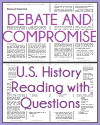 | 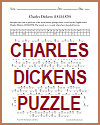 | 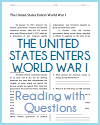 | 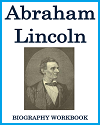 | 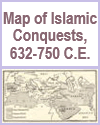 |
| www.studenthandouts.com ↣ American History ↣ American History Readings |








